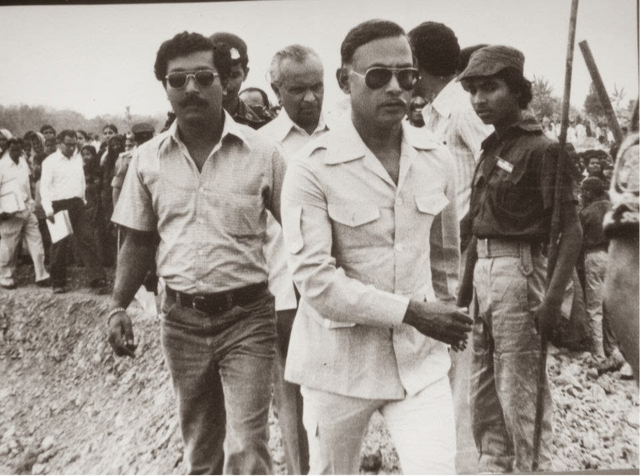Efforts to create a debate around the role of Ziaur Rahman during the Liberation War of Bangladesh in 1971 have become a trend among the rank and file of his political opponents. Zia’s identity as a freedom fighter is being questioned by a vested quarter who even had the audacity of not only claiming that he did not fight during the war but also calling him an agent of the Pakistan Army. In addition, his tenure as the President of Bangladesh has often been criticized without considering the context of that time.
As a ruler, Ziaur Rahman is not immune to criticism. But it was Ziaur Rahman whose ideas transformed Bangladesh in the post-liberation years. The aspirations for which the people of Bangladesh fought during the liberation war started becoming a reality under Ziaur Rahman’s leadership.
Ziaur Rahman fought the liberation war from the front. He united the nation, irrespective of racial identity, gender, or religion, by introducing Bangladeshi nationalism. As it appears, he managed to attain significant success both as a soldier and leader of the nation.
Despite these achievements, a smear campaign has been launched against him out of an inferiority complex. This sense of inferiority is more common among the ones who did not or could not fight the war on the battlefield, observed the war from a safe distance, or even worked in cahoots with Pakistani authority. Hence, their efforts to demean a freedom fighter’s reputation reflect their psychological weakness as individuals.
As a freedom fighter and as the leader, Ziaur Rahman became an integral part of Bangladesh’s history. The economic and political aspiration of creating a new identity for the inhabitants of East Bengal was initiated during the partition of Bengal in 1905 and was re-shaped by Ziaur Rahman. He adopted the mainstream politics of this region and realized their aspiration through successful economic and political programs.
Claiming that Ziaur Rahman came to power through a military coup would be irrational. He emerged as the leader at a critical juncture of history on November 7, 1975, that too not on his own will. Soldiers took him out of his home where he was kept under lock and key, put him on their bare shoulders, and brought him to the center of power. Later, he entered politics with the support of the people. Despite his assassination by some misguided military officers, BNP managed to survive the turbulent decades in politics. His charisma and immense popularity among the mass people helped BNP to survive and become one of the major political parties of Bangladesh.
One of the best qualities of Ziaur Rahman was his pragmatism. He made pragmatic and visionary decisions without wasting time, which bore fruits for Bangladesh and BNP in the long run. If we analyze his acts during the liberation war and the way he ran the country, this pattern of pragmatism would be clearly visible.
Any discussion about Ziaur Rahman’s military and political life would cover many different aspects. Apart from introducing Bangladeshi nationalism and strengthening the economy, Zia took extraordinary measures, including building a strong armed force to defend our sovereignty, digging canals to solve the water crisis and floods, establishing village governments (Gram Sarkar) to give agency to the rural mass, reforming agriculture sector, expediting mass education program, upskilling the bureaucrats, reducing the unemployment rate, encouraging production by ensuring enabling environment, introducing girls’ football tournament, allocating funds for filmmaking, and introducing Independence Award and Ekushe Award– to develop a pro-people welfare state.
But it was the liberation war that shaped his indomitable morale, and it is a reality that no one can deny because his name is an integral part of the liberation war of Bangladesh. He led the war from the front, and as a recognition of his contribution to the war, he was awarded Bir Uttam by the Mujib regime. Since Zia’s name is among the first few people on the list of gallantry awards recipients, if someone claims Zia did not fight the war and was Pakistan’s agent, it can be concluded that the then government was so incompetent that they gave away the most important gallantry award to the person who served as a Pakistani agent during the war.
It is obvious that no ruler can satisfy every citizen of a country and is immune to criticism. Some of his steps — amending the constitution with religious wordings, allowing anti-liberation elements to join politics, trying Colonel Taher and some other military officials, and bringing back Sheikh Hasina to Bangladesh — have irked many. Yet, the fact remains Ziaur Rahman was the one who introduced a broad and multi-party democratic system and transformed the country from a one-party state to a participatory democracy, one of the most essential elements to ensure accountability in the politics of Bangladesh.
Omitting Zia’s name from the history of Bangladesh is extremely difficult because the politics that he introduced were based on the ideology of the common mass. Hence, those who want to demean him would fail miserably. On the other hand, exaggerating his contribution to appease his followers would similarly go in vain. History will decide how a sector commander who made one of the most important declarations of Bangladesh, and a President whose policies shaped Bangladesh’s economy and society, would be evaluated.
Ziaur Rahman is a war hero who fought the war from the front. Thanks to his wisdom, decision-making capabilities, and efficiency as a soldier, he not only became a key figure in the liberation war but also earned popularity. This popularity as a soldier of the nation became a political asset for him as the President and helped him to consolidate his position.
On the night of March 25, the Pakistani army launched a brutal crackdown on innocent Bangladeshi civilians. Ziaur Rahman revolted at midnight of March 25 from Chattagram (then Chittagong) with his 8th East Bengal Regiment. After Pakistani crackdown, the whole country was confused and under tremendous pressure. Zia’s revolt at once removed the confusion and opened up choices to act for Bangladeshis.
Within a week, other Bengali military officials of other cantonments followed suit. Ziaur Rahman’s declaration of independence was widely circulated then and electrified the people, as well as gave them hope. A nation that was devoid of any direction found the aspiration to hit back at the Pakistanis. Training centers were established to train freedom fighters across the border areas and even inside the country. Almost all the Bengali officers of the Pakistan army joined the liberation war, except for Hussain Muhammad Ershad and some others who were in Pakistan then.
Zia’s declaration over the radio was enough to instill fear in the minds of Pakistanis. This became a reason for their initial debacle in the battles in the Chattagram region. After the declaration, Zia focused on reorganizing the soldiers and ambushing the Pakistanis. Later, he crossed the Karnafuli River and mingled with the civilian populace.
The participation of so many trained military officials and soldiers like Ziaur Rahman in the liberation war of Bangladesh added a new dimension to the liberation war of Bangladesh. Bangladeshi freedom fighters started defeating the Pakistanis under the close supervision and leadership of Zia and his compatriots. By December 16, Pakistanis lost the war and surrendered.
Each of the freedom fighters is a bright star in the history of our liberation war. Everyone played their respective role, and that brought us freedom. But the radio declaration of Zia brought him glory. People of the country will remember his words ‘I, Major Zia,’ forever. Being a rebel, accepting the uncertainties of the situation, and mobilizing the mass for the cause, is not everyone’s job. Those who can achieve this unachievable become an integral part of history. Ziaur Rahman is among these few individuals in the history of Bangladesh.
People of the country got to hear ‘I, Major Zia’ twice, first at midnight on March 25, 1971, and then again on November 7, 1975. Bangladesh, on both occasions, was on the brink of collapse. Ziaur Rahman, with his courage and talent, came forward to save the nation on both occasions.
Zia was not a politician. But he outpaced all the politicians in his own right. He was successful both as a freedom fighter and as a political leader. He led the country during the liberation war from the front. As the President, he dropped the ‘Basket case’ label from Bangladesh’s name by introducing the politics of development and production. He came down hard on corruption and took steps to safeguard the sovereignty.
Ziaur Rahman adopted the political philosophy of the people of East Bengal and brought it into mainstream politics. Those who are against the economic and political progress of East Bengal feel threatened by the progress of the people of this region. They are the ones who fled from the battlefield and now criticize Ziaur Rahman out of envy.
*Revised and updated from an earlier Bangla version published in the Prothom Alo.


